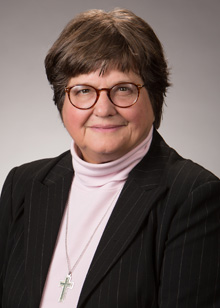
A LIFETIME OF SERVICE Death-penalty
critic Sister Helen Prejean. |
With our death penalty, which most nations have abandoned; with our 80,000 prisoners in solitary confinement, which human-rights groups call torture; and with our imprisonment rate five times the world average — the United States is a very harsh country indeed.
Why is America so vicious to lawbreakers?
Sister Helen Prejean, the country’s leading critic of the death penalty, addressed this question in an afternoon interview with the Phoenix before she spoke on the evening of October 18 in Portland, her talk concluding a local four-day “symposium” of discussions and performances on the topic “Culture of Punishment.”
We are such strong social animals that “culture blinds us,” she said. And American culture she saw as reflecting an individualistic society historically tilted toward the wealthy — but more so in recent times — in such a way that it demonizes the poor, who fill the jails and prisons.
The non-poor are not aware of “the currents and whirlpools in the river that pull at people when they’re poor.” Growing up a privileged white child in Jim Crow Louisiana, she never reflected, she said, on such features of everyday life as separate public water fountains for blacks and whites.
But her eyes opened wide when she started teaching in the impoverished New Orleans housing projects.
The author of the 1993 best-seller Dead Man Walking — made into an award-winning film starring Sean Penn and Susan Sarandon — the 74-year-old, jean-jacketed, folksy Catholic nun also described how a culture of racism contributed to American harshness toward convicted criminals.
Whites in the Southern states — the states that by far execute the most prisoners and have the highest incarceration rates — were “furious at desegregation” in the mid-twentieth century, she said. They engaged in “pushback” by dealing harshly with poor black people who ran afoul of the law.
(For how Southern attitudes toward prisoners migrated north, read the Phoenix review of the book Texas Tough, by Robert Perkinson, “Why Did the Liberals Help Construct Our Concentration Camps for the Poor,” September 10, 2010, by Lance Tapley.)
The physical separation of prisoners from the rest of society, Prejean suggested, makes it hard for non-incarcerated people to escape from their own social confinement and see what prisoners endure.
Prisoners are separated from society in another way when they’re turned into alien beings by the opportunism of politicians vying to be tough on crime. This process is aided, she said, by sensationalist news media.
Progress depends on breaking through the cultural barriers. “Give people a chance to be in touch” with prisoners, she said, and attitudes will change.
That is what happened to her when she became a pen pal and then friend to Louisiana death-row inmates at that state’s notorious Angola penitentiary. Those relationships — as she tended to prisoners’ spiritual needs all the way to the electric chair — bore fruit with Dead Man Walking. She had become “a witness.”
Despite what she has witnessed, Prejean appears optimistic. Although 63 percent of Americans still support the death penalty, public opinion is turning against it. She saw hope particularly in the more tolerant cultural views of young people. For example, they’re “getting it” about gays.